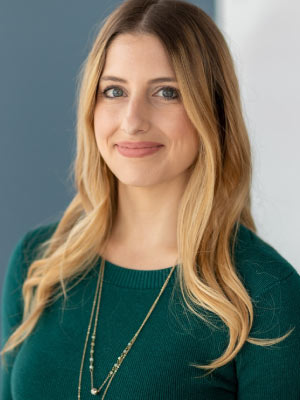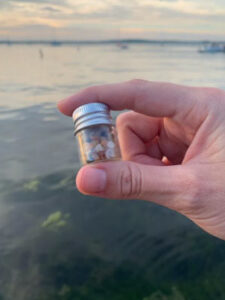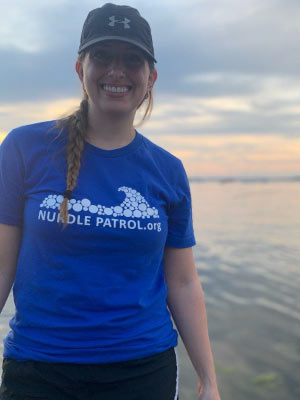
From the Gulf Coast to the Great Lakes, Nelson Institute student Lisa Scobel is working to keep waterways free of plastic pollution. As a student of the Environmental Conservation MS program, Scobel is embracing her passion for protecting marine life and environment in her final leadership project.
Through a Citizen Science initiative called Nurdle Patrol, Scobel is working with the Mission-Aransas National Estuarine Research Reserve to expand their efforts to minimize nurdle pollution in waterways. The project collects and reports data to raise awareness and incite policy change, regulation, and reform regarding the issues posed by nurdle pollution
A “nurdle” is a small plastic pellet, about the size of a fish egg, that serves as the raw material used in production of other plastic products. Nurdles can pollute waterways and railroads by escaping from transportation, or through unfortunate cases of intentional dumping.
“When people think about plastic pollution, they tend to think of the end product; plastic bags, utensils, bottle caps, but very rarely do people think about their initial form, nurdles,” Scobel reflected.

There are about two-hundred-fifty thousand tons of nurdle pollution that enter waterways each year. Due to their size, many marine animals confuse nurdles for food, harming their digestive tract. Similarly, nurdles easily absorb chemicals, which if consumed can bioaccumulate up the food chain to harm many other species.
Scobel views plastic pollution as one of the most pressing environmental issues we face today and is both fascinated by and passionate about tackling the problem.
“In the scheme of things, we haven’t really been using plastic for that long and yet the environmental impact that it has is so devastating and huge, Scobel said. “I thought it would be really great to learn more about plastic pollution and how I can make a difference.”
Nurdle Patrol is mainly located in southern coastal areas, but Scobel is working to bring the project to the Great Lakes region and the Mississippi River. Pollution data can be seen on Nurdle Patrol’s map, a resource comprised of the data collected by citizen scientists around the country.

Scobel has worked in the field to collect data in addition to her endeavors of expanding the initiative. She hopes that Nurdle Patrol’s work will make government officials aware of the issue and help devise a proper plan to remediate and prevent nurdle pollution.
Scobel has close proximity to the issue of plastic pollution, as she grew up on the Gulf Coast in New Orleans, La. She recalls visiting the beaches of Florida and Alabama as a child and feels a connection to keeping aquatic life and the environment as safe and clean as possible.
Scobel joined the Environmental Conservation program at Nelson to make a career pivot in the direction of her passion, marine and environmental conservation. Working in the Maritime industry, Scobel serves as a project coordinator for the American Bureau of Shipping Group (ABS Group). Her work is mainly administrative, focusing on business and proposal development.
Scobel has continued working for ABS Group while pursuing her Environmental Conservation degree. While she enjoys her current work, her passion for protecting wildlife and the environment was a driving force behind her career shift. Once the realization was made that she had room to make a pivot, she was eager to hit the ground running.
“I loved that Nelson offered the Environmental Conservation program as a 15-month expedited program so I could get out into the workforce even sooner,” Scobel said.
Scobel obtained her undergraduate degree in Cultural Resource Management, which she explained has similar foundational ideas as environmental conservation but involves history and museums. This background helped her throughout the course of the program.
“One of the great things about the Environmental Conservation program is that it focuses on lots of leadership and management skills that you can get from a variety of backgrounds, Scobel said. “But for someone like me who doesn’t have the scientific educational background it’s a great transition to be able to merge into the environmental workspace but still be able to use my prior professional skills.”
Scobel has begun the process of seeking a new role that fulfills her passion of working in Environmental Conservation and can see herself doing similar work to that of Nurdle Patrol in the future.
You can help Nurdle Patrol’s efforts by conducting your own nurdle survey, and viewing Nurdle Patrol’s interactive data map.
Learn more about the Environmental Conservation MS Program and how you can support the program.